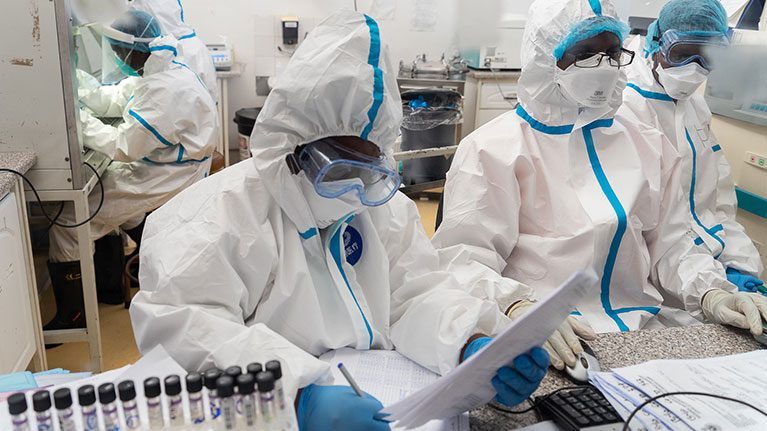The International Labour Organisation (ILO) called on authorities to improve national occupational safety and health policies to ensure workers are protected.
In an event held on Wednesday to mark World Day for Safety and Health at Work, the ILO addressed the need to adopt more safety measures and systems by countries worldwide, including Qatar, to minimise risks for workers in the event of future health emergencies.
The virtual discussion on the “importance of anticipating, preparing and responding to crises: invest now in resilient occupational safety and health, in the context of Covid-19” was attended by ILO Director General Guy Ryder as well as a panel of global leaders and senior representatives from governments, employers and global organisations.
An ILO report cites 7,000 health workers have died since the crisis outbreak, while 136 million health & social care workers are at risk of contracting #COVID19 through work. Now is the time to respond & reduce the risk of transmission in the workplace.https://t.co/RerU8Hoeju
— International Labour Organization (@ilo) April 28, 2021
The speakers shed light on Qatar’s various projects that are designed to achieve a unified registry for occupational injury prevention across the Gulf state, while also working to protect workers.
To achieve this objective, Qatar has seen collective national efforts from the Ministry of Labour, along with the Ministry of Public Health, Hamad Medical Corporation, Qatar Red Crescent Society, Ministry of Interior, Public Works Authority (Ashghal), ILO and the Primary Health Care Corporation.
Read also: Public awareness on labour law changes ‘low’: survey
In a statement the ILO said it is essential to install Occupational Safety and Health protocols worldwide.
“Recognising that a robust national OSH system safeguards lives and livelihoods, it is imperative to have OSH systems well-resourced and robust enough in order to better pre-empt the impacts, tackle the challenges head on, provide resiliency to the world of work, and indirectly positively affect public health,” ILO said.
Attendees also elaborated on the importance of investing in OSH infrastructure, both programmatically and financially, and integrating the investments into overall national crisis emergency readiness and response plans “so that workers’ safety and health is protected, and the business continuity of enterprises is supported.”
Ryder stressed the importance of taking action as well as the urgent need to start implementing major steps to prepare people as they face the Covid-19 pandemic to be better equipped for future health crises.
“Countries need to put in place sound and resilient occupational safety and health systems,” ILO said in its Anticipate, prepare and respond to crises. Invest now in resilient OSH systems report.
Among the issues highlighted in the report is risk prevention and management relating to the ongoing health pandemic. It also analyses issues that pose a risk to the health and safety of workers due to the changing work arrangements as a result of ever-changing health precautionary measures.
“There could be no clearer demonstration of the importance of a strong, resilient, occupational safety and health environment. Recovery and prevention will require better national policies, institutional and regulatory frameworks, properly integrated into crisis response frameworks,” said Ryder.
This would require institutional and regulatory frameworks to be integrated into crisis responses, the UN agency said.
Qatar in handling Covid-19
In Qatar, the Covid-19 response has included a nationwide inoculation drive that encompasses all segments of society. In mid April, Qatar was ranked as ninth worldwide for its rate of Covid-19 vaccine doses administered per person, according to statistics.
The ranking accounts for the total number of vaccination doses administered per 100 people in the total population. It looked at single doses, not the total number of people that have been fully vaccinated, according to Our World In Data.
Qatar launched its inoculation campaign at the end of December but has in recent weeks ramped up and accelerated all efforts to protect the community amid a more severe second Covid-19 wave.
Since February, authorities have been accelerating its vaccination campaign significantly to ensure more people are protected from risk, administrating over 160,000+ doses a week.
Last week, the ministry of health reduced the eligibility age to 35 years.
Read also: Moderna, Pfizer testing ‘tweaked’ vaccine to tackle deadlier variants
The vaccination is being administered free of charge for all residents and citizens of the country.
Qatar’s historic labour reforms
Despite the pandemic, Qatar announced ‘historic; labour reform laws last year that were made effective in March of this year.
As part of the programme, the Gulf state introduced the region’s first ever non-discriminatory minimum wage.
In addition to the minimum monthly basic wage of 1,000 Qatari riyals QR (275 USD), the new legislation stipulates that employers must pay allowances of at least QR 300 for food and QR 500 for housing, should employers not provide workers with these directly.
As part of the major labour reform agenda, Qatar has drastically enhanced monitoring across the board to detect violations, enacting swifter penalties and further strengthening the capacity of labour inspectors, according to an announcement made by the Government Communications Office (GCO).
Employers who pay their staff less than the minimum wage will face one-year in jail and a QR 10,000 fine.
The reforms also include the dismantling of the controversial “kafala” or sponsorship system, becoming the first country in the region to do so.
Workers are no longer required to obtain an exit permit to leave the country, or a No Objection Certificate (NOC) to request permission from former employers to change jobs.
In an exclusive interview with Doha News in March, senior International Labour Organisation (ILO) official, Houtan Homayounpour said more work needs to be done to ensure the protection of workers in Qatar, though authorities should be recognised for the work that has gone into making these changes.
Follow Doha News on Twitter, Instagram, Facebook and Youtube







